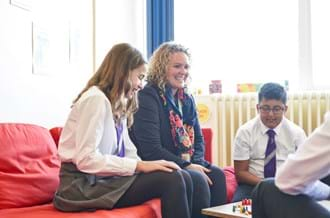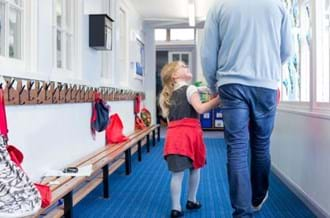What impact are Place2Be services having on education?
What impact are Place2Be services having on education?
- Children and young people who have experienced school suspension show improved mental health and a reduction in school suspensions following counselling with Place2Be.
- Place2Be’s counselling contributes to improved school attendance among children and young people who are persistently absent.
- Place2Be supports improvement in pupils’ engagement and attitudes to learning.
- There is an improvement in the impact that children and young people’s mental health difficulties are having on the classroom and learning following counselling with Place2Be.
Children and young people who have experienced school suspension show improved mental health and a reduction in school suspensions following counselling with Place2Be.
- Analysis of Place2Be data from 2017/2018 and 2018/2019, shows that children and young people who had previously experienced school suspensions were facing greater adversity and had more complex and severe difficulties than those who had not experienced suspension.
- Despite these initial risk factors for poor outcomes, there was a significant reduction in sessions of subsequent suspension (from an average of two school weeks to half a school week) after one-to-one counselling for children and young people who had previously experienced suspension.
- 74% had fewer suspensions and 56% did not have any subsequent suspensions in the academic year that counselling took place.
- These children and young people also had improved mental health as measured by the teacher and parent reported SDQ.
- Place2Be’s peer-reviewed publication ‘From a child who is a problem to a child who has a problem’ presents this evidence and suggests that school counselling could be a useful tool to address the mental health difficulties of students at risk of/with a history of suspension and reduce subsequent suspensions.
Place2Be’s one-to-one counselling contributes to improved attendance at school children and young people who are persistently absent.
- In an analysis of Place2Be’s data (2016-2019) by our academic partners at the University of Cambridge, one-to-one counselling was shown to be significantly associated with reduced persistent absence from school. This evidence is presented in the peer-reviewed publication 'One-to-one counselling and school attendance in the UK'.
- Children and young people whose ‘probable disorder’ status on the SDQ improved also showed improvement in percentage of school attendance (from 94% before counselling to 95% after).
- While we cannot determine causality from this analysis, these findings suggest that Place2Be’s one-to-one counselling may be improving school attendance.
Place2Be supports improvement in pupils’ engagement and attitudes to learning.
- Following one-to-one counselling with Place2Be, we find improvements in pupils’ engagement and attitudes to learning, in terms of concentrating hard in lessons, answering questions, and enjoying classroom work.
- In 2020/2021, approximately half (48%) of children’s overall attitude towards learning improved following counselling.
- Positive associations were also found for school engagement in our attendance analysis. While we cannot infer causality, one-to-one counselling was associated with improved school engagement which coincided with reduced persistent absence. Read our peer-reviewed publication about this.
There is an improvement in the impact that children and young people’s mental health difficulties are having on the classroom and learning following counselling with Place2Be.
- There is an improvement in the impact that children and young people’s mental health difficulties are having on their learning, as well as the impact it is having on their teacher and the school class.
- 64% of those whose mental health difficulties had impacted on their classroom learning had improved and 66% of those whose difficulties caused problems for their teacher or class had improved (teacher reported SDQ).
- Pupils who have Place2Be’s counselling are keeping pace academically with similar pupils who do not have Place2Be support.
- Place2Be’s analysis of the academic progress from Key Stage 1 to Key Stage 2 of primary school aged pupils found that children attending Place2Be schools achieved similar Key Stage 2 English and maths levels as similar pupils in schools without Place2Be. This evidence is presented in the peer-reviewed publication 'Investigating the academic attainment and progress of children in receipt of individual counselling' and indicates that individual school-based counselling may be helpful in supporting the academic progress of primary school children who are referred for counselling.
- 77% of the Place2Be school pupils and 77% of the non-Place2Be school pupils achieved Level 4 or above in Key Stage 2 English.
- 77% of the Place2Be school pupils and 76% of the non-Place2Be school pupils achieved Level 4 or above in Key Stage 2 maths.
- When compared with those who still have severe mental health difficulties after counselling, those who show clinical recovery (i.e. are no longer in the ‘severe’ difficulties range on the SDQ) make significantly more progress between Key Stage 1 and Key Stage 2 in English and maths.
News & blogs

Launch of good practice guide for schools - supporting displaced families
Place2Be is proud to have collaborated with Save the Children UK in the creation of a good practice guide.
Read more
The £51 billion case for improving children’s mental health
Read the latest PBE report on how preventing mental health decline in children is also an investment in society's future.
Read more
Fostering the power of relationships
Celebrate the power of relationships to transform the lives of children and young people in foster care.
Read more



